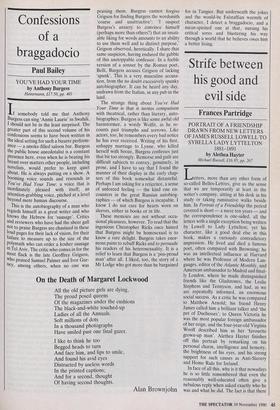Confessions of a braggadocio
Paul Bailey
YOU'VE HAD YOUR TIME by Anthony Burgess
Heinemann, £17.50, pp. 403
If somebody told me that Anthony Burgess can sing 'Annie Laurie' in Swahili, should not be in the least surprised. The greater part of this second volume of his confessions seems to have been written in the ideal setting for such a bizarre perform- ance — a smoke-filled saloon bar. Burgess the public house anecdotalist is a constant presence here, even when he is beating his breast over matters other people, including novelists, would prefer to keep quiet about. He is always putting on a show. A booming voice sounds and resounds in You've Had Your Time: a voice that is inordinately pleased with itself; an attention-grabbing voice, pitched at a level beyond mere human discourse.
This is the autobiography of a man who regards himself as a great writer and who knows the Hebrew for 'sausage'. Critics and reviewers who have had the sheer gall not to praise Burgess are chastised in these loud pages for their lack of vision, for their failure to measure up to the size of the Polymath who can order a kosher sausage in Tel Aviv. The critic who comes in for the most flack is the late Geoffrey Grigson, who praised Samuel Palmer and Ivor Gur- ney, among others, when no one was praising them. Burgess cannot forgive Grigson for finding Burgess the wordsmith `coarse and unattractive': 'I suspect Burgess's anxiety to convince himself (perhaps more than others?) that an insati- able liking for words amounts to an ability to use them well and to distinct purpose,' Grigson observed, heretically. I share that same suspicion, having endured the gabble of this unstoppable confessor. In a feeble version of a sonnet by the Roman poet, Belli, Burgess accuses Grigson of lacking `spunk'. This is a very masculine accusa- tion, from the no doubt excessively spunky autobiographer. It can be heard any day, undrawn from the Italian, in any pub in the land.
The strange thing about You've Had Your Time is that it invites comparison with theatrical, rather than literary, auto- biographies. Burgess is like some awful old barnstormer, a wordy Wolfit, as he re- counts past triumphs and sorrows. Like actors, too, he remembers every bad notice he has ever received. Writing of his first, unhappy marriage to Lynne, who killed herself with booze, Burgess confesses just that bit too strongly. Remorse and guilt are difficult subjects to convey, genuinely, in prose, and I have to say that I found the manner of their display in the early chap- ters of this book somewhat distasteful. Perhaps I am asking for a reticence, a sense of unforced feeling — the kind one en- counters in the great Russian autobiog- raphies — of which Burgess is incapable. I know I do not care for hearts worn on sleeves, either in books or in life.
These memoirs are not without occa- sional pleasures, however. To read that the ingenious Christopher Ricks once hinted that Burgess might be homosexual is to know a rare delight. Burgess takes enor- mous pains to rebuff Ricks and to persuade his readers of his heterosexuality. It is a relief to learn that Burgess is a 'piss-proud man' after all. I liked, too, the story of a Mr Lodge who got more than he bargained for in Tangier. But underneath the jokes and the would-be Falstaffian warmth of character, I detect a braggadocio, and a mean-spirited one at that, nursing his critical sores and blustering his way through a world that he believes owes him a better living.


































































 Previous page
Previous page